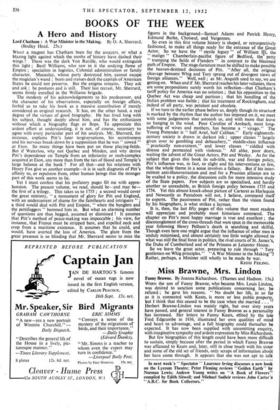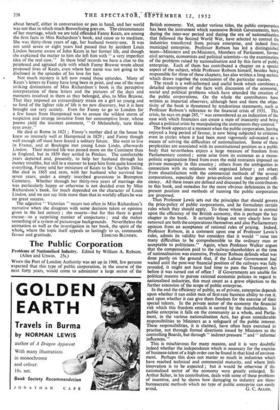Miss Brawne, Mrs. Lindon
Fanny Brawne. By Joanna Richardson. (Thames and Hudson. 15s.) WHEN the son of Fanny Brawne, who became Mrs. Louis Lindon, was &Sired to sanction some publications concerning her, he refused ; he gave his reasons. " No doubt her life, in so far as it is connected with Keats, is more or less public property, but I think that this ceased to be the case when she married . . . ' Herbert Brawne-Lindon was mainly right, but over sixty years have passed, and general interest in Fanny Brawne as a personality has increased. Her letters to Fanny Keats, edited by the late ' Fred Edgcumbe in 1936, illustrated her own qualities of mind and heart to advantage, and a full biography could thereafter be expected. It has now been supplied with unremitting enquiry, with imaginative sympathy and ardent expression by Miss Richardson.
But few biographies of this length could have been more difficult to sustain, simply because after the period in which Fanny Brawne was affianced to Keats and, later, still in close touch with his sister and some of the old set of friends, only scraps of information about her have come through. It appears that she was not apt to talk about herself, either in conversation or pen in hand, and her world was not that in which much Boswellizing goes on. The circumstances of her marriage, which we are told offended Fanny Keats, are among the firm facts in Miss Richardson's book, and cause us to meditate. She was thirty-three years of age, her husband twenty-one. It was not until seven or eight years had passed that by accident Louis Lindon became aware of John Keats in her former life, and though she explained the matter to him she left him with " a very imperfect idea of the real case." In these brief records we have a clue to the perplexed and agitated style with which Fanny Brawne wrote about proposed lives of Keats, even where her name was not going to be disclosed in the episodes of his love for her.
Not much mystery is left now round those episodes. Many of Keats's letters to Fanny have long been in print, and one of the most striking distinctions of Miss Richardson's book is the perceptive interpretation of these letters and the pictures of the days and moments involved in them as they belonged, also, to Miss Brawne. That they imposed an extraordinary strain on a girl so young and so fond of the lighter side .of life is no new discovery, but it is here brought out very acutely. Even for Fanny to go to London for a few hours from Hampstead was to arouse the wildest storm of suspicion and strange invective from her consumptive lover, whose poems yield the insistent comment, " 0 Melancholy, turn thine eyes away."
He died at Rome in 1821 ; Fanny's mother died at the house he knew so intensely well at Hampstead in 1829 ; and Fanny though well enough off must have feared a solitary future. She went to live in France, and at Boulogne met young Louis Lindo, afterwards Lindon. Their married life was passed more on the Continent than in England, but in 1859 they settled in Pimlico. The comfortable years departed and, presently, to help her husband through his money troubles, but still in a manner to keep him from quite knowing everything, Fanny sold her miniature of Keats to Sir Charles Dilke. She died in 1865 and rests, with her husband who survived her seven years, under a simply inscribed gravestone in Brompton Cemetery. Whether through her thirty-two years of marriage she was particularly happy or otherwise is not decided even by Miss Richardson's book, for much depended on the character of Louis Lindon, and we can say little more than that in worldly affairs he was no great success.
The adjective " Victorian " recurs too often in Miss Richardson's narrative when she disagrees with some decision taken or opinion given in the last century ; she resorts—but for this there is good excuse—to a surprising number of conjectures ; and she makes something of a system of picturesque backgrounds. Nevertheless the animation as well as the investigation in her book, the spirit of the whole", where the topic itself appeals so lastingly to us, commands



































 Previous page
Previous page